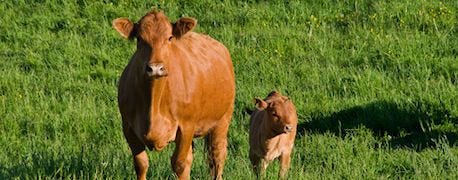
Ask beef producers, retailers, and consumers what their definition of sustainability is and you'll likely come up with a wide range of answers. "Everybody has a different perspective on what sustainability means," says ISU Extension beef specialist Denise Schwab.
The Driftless Region Beef Conference in Dubuque January 22-23, 2015, will discuss some of these different definitions of sustainability. Keynote speaker Jude Capper, self-employed sustainability consultant and adjunct professor of animal sciences at Washington State University will share her research on the environmental impact of U.S. beef production from 1977 to 2007.

DIFFERENT PERSPECTIVES: Everyone has their own perspective on what sustainable beef means. A key topic at this year's Driftless Region Beef Conference in Dubuque will be sustainability, where various sectors of the beef industry will be represented, including keynote speaker Dr. Jude Capper.
Capper's study modeled the metabolism and nutrient requirements of the beef industry to establish the amount of resource inputs and waste outputs needed to produce a set amount of beef at each point in time. Capper's model showed that the same amount of beef was produced in 2007 with 30% fewer animals, 19% less feed, 12% less water, on 33% less land, with 18% less manure, 18% less methane, and 12% less nitrate compared to 1977. This resulted in a carbon footprint that is 16.3% smaller than in 1977. While the carbon footprint is only one aspect of sustainability, her study shows that modern beef production is raising more beef with fewer inputs and less waste.
"Dr. Capper is looking at sustainability from a standpoint of inputs and outputs – how much input did it take to produce the same quantity of beef from 1977 to 2007?" Schwab says. "Others may define sustainable beef by how it supports local farmers, or how close the beef is produced to where it can be consumed. With the Global Roundtable for Sustainable Beef announcing their definition of sustainable beef, we're hoping to bring all sectors of the beef industry closer together in understanding what that definition means."
~~~PAGE_BREAK_HERE~~~
Both ends of the spectrum
Breakout sessions on Thursday and Friday will cover a variety of topics relating to sustainability. On Friday, Tom Arnold, owner of Arnold Farm near Elizabeth, Illinois will share tips for success in direct marketing. Arnold has been direct marketing grass-fed and grain-fed beef, pork, sheep, pasture poultry, turkey and pork in the Jo Daviess County, Illinois and Chicago area for almost 20 years.
"We'll have Dr. Capper on one end talking about how much more efficient we are at producing beef today than 40 years ago, and Tom Arnold, a local producer who sells direct to consumers and has everything from commodity to specialty beef to specialty natural meats," Schwab says. "In the upper Midwest, we have both ends of the beef production spectrum, and we're trying to address both ends."
Other breakout sessions include: Gene Schriefer, University of Wisconsin Extension Iowa County Agriculture Educator, who will discuss economics of marginal corn ground compared to seeding to pasture or hay; ISU Professor and Director of the Iowa Beef Center, Dan Loy, who will provide an update on the Beef Center's feed efficiency project and implications to commercial producers and feeders; Dr. Joe Dedrickson of Merial Animal Health will discuss responsible use of antibiotics; and Purdue University Clinical Professor of Beef Production Medicine, Dr. Mark Hilton will discuss how the calf in the feedlot fits into all sectors of beef production.
A panel session on Thursday evening featuring Mark Hilton, Dan Loy, Gene Schriefer, and Tom Arnold will set the stage for this year's topic of diversity within the beef industry. "Each panel member will give a five-minute overview of their operation and diversity in the industry and open it up to questions from the audience," Schwab says. "The main topic is the diversity within the cattle industry and seeing where your niche is, and where you fit. We have everything from grassfed to commodity production beef, and we're trying to help producers see that there is room in this industry for all of us."
~~~PAGE_BREAK_HERE~~~
For example, Dan Loy will bring a perspective on the cattle industry's growth in Iowa and opportunities for producers in reaching growing markets. Meanwhile, Mark Hilton will discuss technology available to producers, like implants, ionophores, and beta agonists, and where which technologies fit best.
Registration and additional information
The Conference runs from 1 p.m. on Thursday, Jan. 22 through 11:45 a.m. on Friday, Jan. 23. The Early registration for the conference is $85 per person and must be received prior to midnight, Jan. 14. The price increases to $115 after that date. More information about the conference, including topics, speakers, and lodging is available at www.aep.iastate.edu/beef. Registration begins Dec. 1, with links for online and mail forms available on the conference website.
The Driftless Region Beef Conference is sponsored by the University of Illinois Extension, Iowa State University Extension and Outreach, the University of Minnesota Extension, and University of Wisconsin Extension. For more information or to receive a brochure, contact Denise Schwab, ISU Extension Beef Specialist, at 319-721-9624.
About the Author(s)
You May Also Like






